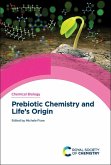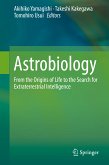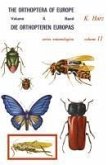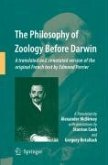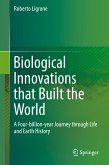R J P Williams, Ros Rickaby
Evolution's Destiny (eBook, PDF)
Co-evolving Chemistry of the Environment and Life
82,95 €
82,95 €
inkl. MwSt.
Sofort per Download lieferbar

41 °P sammeln
82,95 €
Als Download kaufen

82,95 €
inkl. MwSt.
Sofort per Download lieferbar

41 °P sammeln
Jetzt verschenken
Alle Infos zum eBook verschenken
82,95 €
inkl. MwSt.
Sofort per Download lieferbar
Alle Infos zum eBook verschenken

41 °P sammeln
R J P Williams, Ros Rickaby
Evolution's Destiny (eBook, PDF)
Co-evolving Chemistry of the Environment and Life
- Format: PDF
- Merkliste
- Auf die Merkliste
- Bewerten Bewerten
- Teilen
- Produkt teilen
- Produkterinnerung
- Produkterinnerung

Bitte loggen Sie sich zunächst in Ihr Kundenkonto ein oder registrieren Sie sich bei
bücher.de, um das eBook-Abo tolino select nutzen zu können.
Hier können Sie sich einloggen
Hier können Sie sich einloggen
Sie sind bereits eingeloggt. Klicken Sie auf 2. tolino select Abo, um fortzufahren.

Bitte loggen Sie sich zunächst in Ihr Kundenkonto ein oder registrieren Sie sich bei bücher.de, um das eBook-Abo tolino select nutzen zu können.
- Geräte: PC
- mit Kopierschutz
- eBook Hilfe
- Größe: 3.31MB
Andere Kunden interessierten sich auch für
![Prebiotic Chemistry and Life's Origin (eBook, PDF) Prebiotic Chemistry and Life's Origin (eBook, PDF)]() Prebiotic Chemistry and Life's Origin (eBook, PDF)196,95 €
Prebiotic Chemistry and Life's Origin (eBook, PDF)196,95 €![Evolution's First Philosopher (eBook, PDF) Evolution's First Philosopher (eBook, PDF)]() Jerome A. PoppEvolution's First Philosopher (eBook, PDF)28,95 €
Jerome A. PoppEvolution's First Philosopher (eBook, PDF)28,95 €![California's Amazing Geology (eBook, PDF) California's Amazing Geology (eBook, PDF)]() Donald R. ProtheroCalifornia's Amazing Geology (eBook, PDF)70,95 €
Donald R. ProtheroCalifornia's Amazing Geology (eBook, PDF)70,95 €![Astrobiology (eBook, PDF) Astrobiology (eBook, PDF)]() Astrobiology (eBook, PDF)161,95 €
Astrobiology (eBook, PDF)161,95 €![Die Orthopteren Europas II / The Orthoptera of Europe II (eBook, PDF) Die Orthopteren Europas II / The Orthoptera of Europe II (eBook, PDF)]() A. HarzDie Orthopteren Europas II / The Orthoptera of Europe II (eBook, PDF)233,95 €
A. HarzDie Orthopteren Europas II / The Orthoptera of Europe II (eBook, PDF)233,95 €![The Philosophy of Zoology Before Darwin (eBook, PDF) The Philosophy of Zoology Before Darwin (eBook, PDF)]() Alex McBirneyThe Philosophy of Zoology Before Darwin (eBook, PDF)113,95 €
Alex McBirneyThe Philosophy of Zoology Before Darwin (eBook, PDF)113,95 €![Biological Innovations that Built the World (eBook, PDF) Biological Innovations that Built the World (eBook, PDF)]() Roberto LigroneBiological Innovations that Built the World (eBook, PDF)137,95 €
Roberto LigroneBiological Innovations that Built the World (eBook, PDF)137,95 €-
-
-
Produktdetails
- Verlag: RSC
- Seitenzahl: 342
- Erscheinungstermin: 31. August 2012
- Englisch
- ISBN-13: 9781849735599
- Artikelnr.: 44765148
Dieser Download kann aus rechtlichen Gründen nur mit Rechnungsadresse in A, D ausgeliefert werden.
- Herstellerkennzeichnung Die Herstellerinformationen sind derzeit nicht verfügbar.
Professor Bob Williams, MA, DPhil, FRS, is Emeritus Fellow at Wadham College and Emeritus Professor, University of Oxford. Born in 1926, he was educated at Wallasey Grammar School. He studied Chemistry at Merton College, Oxford, graduating in 1948. During the course of his Part II work the Irving-Williams series of the stabilities of complex ions, which is of paramount importance in both non-living and living systems, was discovered. He took his doctor's degree at Oxford in 1950 working with Professor H.M.N.H. Irving. With Professor A. Tiselius (Uppsala, Sweden) 1950-51, he developed certain (gradient elution) chromatographic methods of analysis. He then became lecturer and tutor in Chemistry at Wadham College, 1955-65. In 1961 he proposed proton-gradient-driven ATP formation as the driving force of bio-energetics. With C.S.G. Phillips, in 1996, he wrote a textbook of Inorganic Chemistry. After a year at Harvard University, 1965-66, with Professor B.L. Vallee, he changed to teach biochemistry until 1974. With Vallee he noted the entatic (constrained) state of atoms at enzyme sites. He became, successively, a Reader (1972) and Napier Royal Society Research Professor at the University of Oxford (1975-1991). He was elected Fellow of The Royal Society in 1972 and is a Foreign Member of the Swedish, Portugese, Czechoslovakian and Belgian science academies. He has given named lectures series in several European and North American Universities and numerous plenary international lectures at many Chemistry, Biochemistry and Biology Conferences. He is a medallist of the Biochemical Society (twice), The Royal Society (twice), The Royal Society of Chemistry (three times), The European Biochemical Societies (twice) and the International Union of Biochemistry. He has honorary degrees from Louvain, Leicester, Keel, Lisbon and East Anglia Universities. Bob Williams was a founder member of the Oxford Enzyme group in which he and his colleagues devised many new methods for the study of in vitro and in vivo biological systems, especially using nuclear magnetic resonance spectroscopy. He has recently co-edited a book on Chemistry at Oxford: A History from 1600-2005. He has been named as a Citizen of Honour by Oxford City and has an award from Oxford Preservation Trust for the effective creation of Sunnymead Park in North Oxford. He remains particularly proud of the success of his pupils in all walks of life. Professor Ros Rickaby is Professor of Biogeochemistry at the University of Oxford. Her main research themes include the environment, oceans and climate and lectures in the fundamentals of chemistry, stable isotope geochemistry and the evolutions of climate on long and short timescales.
Chapter 1: Outline of the Main Chemical Factors in Evolution; Chapter 2:
Geological Evolution with Some Biological Intervention; Chapter 3: Organism
Development from the Fossil Record and the Chemistry of the Nature of
Biominerals; Chapter 4: Cells: their Basic Organic Chemistry and their
Environment; Chapter 5: Other Major Elements in Organism Evolution; Chapter
6: Trace Elements in the Evolution of Organisms and the Ecosystem; Chapter
7: The Amalgamation of the Chemical and the Genetic Approaches to
Evolution.
Geological Evolution with Some Biological Intervention; Chapter 3: Organism
Development from the Fossil Record and the Chemistry of the Nature of
Biominerals; Chapter 4: Cells: their Basic Organic Chemistry and their
Environment; Chapter 5: Other Major Elements in Organism Evolution; Chapter
6: Trace Elements in the Evolution of Organisms and the Ecosystem; Chapter
7: The Amalgamation of the Chemical and the Genetic Approaches to
Evolution.
Chapter 1: Outline of the Main Chemical Factors in Evolution; Chapter 2:
Geological Evolution with Some Biological Intervention; Chapter 3: Organism
Development from the Fossil Record and the Chemistry of the Nature of
Biominerals; Chapter 4: Cells: their Basic Organic Chemistry and their
Environment; Chapter 5: Other Major Elements in Organism Evolution; Chapter
6: Trace Elements in the Evolution of Organisms and the Ecosystem; Chapter
7: The Amalgamation of the Chemical and the Genetic Approaches to
Evolution.
Geological Evolution with Some Biological Intervention; Chapter 3: Organism
Development from the Fossil Record and the Chemistry of the Nature of
Biominerals; Chapter 4: Cells: their Basic Organic Chemistry and their
Environment; Chapter 5: Other Major Elements in Organism Evolution; Chapter
6: Trace Elements in the Evolution of Organisms and the Ecosystem; Chapter
7: The Amalgamation of the Chemical and the Genetic Approaches to
Evolution.

